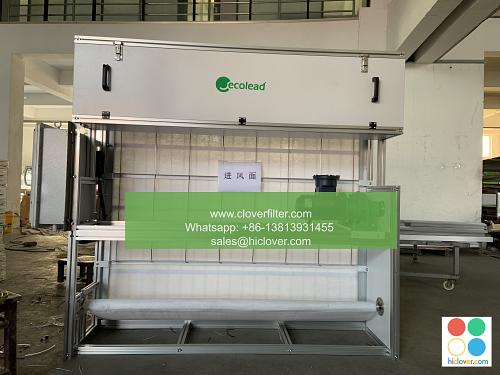Air Quality Control in Nanotechnology Cleanrooms: The Importance of Automatic Roll Air Filters

The nanotechnology industry has experienced rapid growth in recent years, with applications in electronics, pharmaceuticals, biomedical engineering, and materials science. One crucial aspect of working with nanomaterials is maintaining high-quality air in cleanrooms to prevent contamination and ensure precise control over the manufacturing process. In this article, we will discuss the importance of air quality control in nanotechnology cleanrooms and highlight the role of automatic roll air filters in achieving optimal air quality.
Why Air Quality Control is Critical in Nanotechnology Cleanrooms
Nanotechnology cleanrooms require precise control over temperature, humidity, and air quality to prevent contamination and ensure the integrity of the products being manufactured. Even small amounts of contamination can have significant effects on the properties and behavior of nanomaterials, leading to defects and reduced product yield. Therefore, it is essential to maintain high-quality air in cleanrooms to prevent the introduction of particles, gases, and other contaminants.
Challenges in Maintaining Air Quality in Nanotechnology Cleanrooms
Maintaining air quality in nanotechnology cleanrooms is a complex task, requiring careful consideration of various factors, including filter efficiency, airflow rates, and cleanroom design. Traditional air filtration systems often struggle to meet the stringent requirements of nanotechnology cleanrooms, particularly in terms of particle removal and gas filtration. Furthermore, the use of chemical vapors and other hazardous substances in nanotechnology manufacturing processes can pose additional challenges for air quality control.
The Role of Automatic Roll Air Filters in Nanotechnology Cleanrooms
Automatic roll air filters have emerged as a critical component in maintaining air quality in nanotechnology cleanrooms. These filters offer several advantages over traditional air filtration systems, including high filter efficiency, low maintenance, and compact design. By automatically rolling out new filter media as the old media becomes saturated, these filters can maintain consistent air quality levels, even in the presence of high particle concentrations or aggressive chemical vapors.
Key Benefits of Automatic Roll Air Filters in Nanotechnology Cleanrooms
The use of automatic roll air filters in nanotechnology cleanrooms offers several key benefits, including:
* Improved filter efficiency: Automatic roll air filters can capture particles as small as 0.1 microns, ensuring that even the smallest contaminants are removed from the air.
* Reduced maintenance: By automatically rolling out new filter media, these filters minimize the need for manual maintenance and reduce the risk of human error.
* Increased productivity: By maintaining consistent air quality levels, automatic roll air filters can help to reduce product defects and increase overall product yield.
* Enhanced safety: By removing hazardous substances and particles from the air, automatic roll air filters can help to protect the health and safety of personnel working in the cleanroom.
Application Areas for Automatic Roll Air Filters in Nanotechnology
Automatic roll air filters have a wide range of applications in nanotechnology, including:
* Electronic component manufacturing: Automatic roll air filters can help to prevent contamination and ensure precise control over the manufacturing process in the production of semiconductors, microchips, and other electronic components.
* Pharmaceutical manufacturing: These filters can help to maintain sterile conditions and prevent contamination in the production of nanoparticle-based pharmaceuticals and other biomedical products.
* Biomedical research: Automatic roll air filters can help to maintain optimal air quality in biomedical research laboratories, ensuring the integrity of nanoscale experiments and biomedical assays.
* Materials science research: These filters can help to maintain precise control over environmental conditions in materials science research laboratories, enabling the study of nanoscale phenomena and the development of new nanomaterials.
In conclusion, air quality control is a critical aspect of working with nanomaterials in cleanrooms, and automatic roll air filters play a vital role in achieving optimal air quality. By providing high filter efficiency, low maintenance, and compact design, these filters can help to maintain consistent air quality levels, even in the presence of high particle concentrations or aggressive chemical vapors. As the nanotechnology industry continues to evolve, the importance of automatic roll air filters in maintaining air quality in cleanrooms will only continue to grow.

